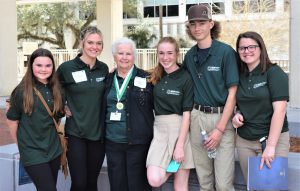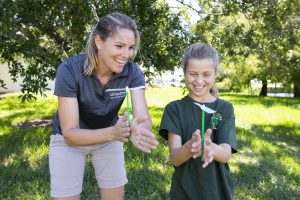What is Subject Matter Expertise?
Subject matter expertise refers to the “technical knowledge and skills possessed to perform tasks related to a specific field(s)” (Harder, 2019). While county 4-H professionals (also known as agents) often bring subject matter expertise in one or more areas to the job, the subject matter expertise of program volunteers helps to expand the availability of potential program offerings. As an organization, 4-H strives to provide opportunities for learning evidence-based content (subject matter) and apply age-appropriate positive youth development (PYD) strategies to facilitate experiential learning via a collaborative youth-adult partnership.
What is a Subject Matter Expert?
Subject Matter Experts (SMEs) “are professionals who have advanced knowledge in a specific field” (Indeed, 2020). Generally, an SME will have “a deep understanding of a particular job, process, department, function, technology, machine, material or type of equipment” (Reh, 2020). In the workplace, being known as an SME is part of a career trajectory and this role or status is often based on a combination of education or training and experience. In the 4-H setting, it is possible that a subject matter expert has gained expertise through informal learning and hands-on experience. The 4-H subject matter expert may not always work professionally in the area of expertise that they bring to 4-H. For example, a skilled volunteer may work as a nurse in their professional career but leads a 4-H sewing club where she can share a deep knowledge subject knowledge and extensive skills gained through years of practice and self-guided study.
Why is Subject Matter Expertise Important to 4-H?
In 4-H, adult staff members and community volunteers work as partners with youth members to help youth “learn by doing.” The 4-H learning experience is based on the idea that “learning is an integrated process where the learner, the educator, the physical space, and culture all are changed by each other” (NIFA, 2016). 4-H clubs provide youth with opportunities to learn subject matter and develop life skills (Knowles and Diem, 2018).
While adults and youth may learn a new skill or acquire new knowledge together in a discovery process, the most common 4-H experience involves working with a subject matter expert who will help to facilitate experiential learning. 4-H learning is intended to be a “dynamic experience in a shifting learning ecosystem” (NIFA, 2016). Together, 4-H staff and community volunteers work together to bring new research and best practices into the learning experience.
How Do We Find Subject Matter Experts?
One way that 4-H can provide specialized subject matter content is through partnerships. For example, 4-H has been successful in partnering with industry professionals and university faculty to implement a variety of STEM programs. A multiyear partnership with NASA has provided many opportunities for youth to explore the world of aerospace science. However, it is not necessary to be a rocket scientist to have subject matter expertise that can be helpful to a 4-H program.
In 4-H, agents have several options available to help develop volunteer subject matter expertise. Agents may look for potential volunteers with specific subject matter expertise to match youth interests. Another option is to engage a caring adult volunteer with a desire to learn an unfamiliar skill or acquire a new knowledge set. For example, a 4-H agent with youth members who want to have a beekeeping club may find a local beekeeper to be a club leader. Another way to match a volunteer with a potential beekeeping club would be to find the adult and arrange for them to attend an Extension education program on beekeeping. Finally, it is also possible to have a volunteer with positive youth development skills that can lead a club and invite guest speakers with expertise to provide subject matter content.
Over time, youth may also become subject matter experts. For example, youth members in Wakulla participated in a poultry science club as Cloverbud and Junior members. After several years of completing projects and participating in competitions, these youth have gained considerable subject matter expertise and have started to teach content and skills to other youth at annual workshops.
Volunteers who want to increase their subject matter knowledge and expertise will find a wealth of resources within 4-H and the larger world of Cooperative Extension. Varied modes of learning are possible – from online seminars, to resource-rich publications, to hands-on experiential learning. For example, volunteers had the opportunity to network with subject matter experts and have robust experiential learning opportunities during our Northwest 4-H Volunteer Forum. After the Forum weekend, volunteers shared that the the event provided opportunities for them to network and connect with other volunteers to gain access to subject matter and experiential expertise. By popular demand, the Northwest 4-H Volunteer Forum will return in January 2023. Watch this space for additional details on how to connect and be part of the weekend event!
How to Get Involved
Do you have a passion for a particular subject matter area, or do you have a skill that you want to share? A variety of volunteer roles with 4-H are possible. Volunteers may serve as club leaders or project leaders, or be a guest instructor, or be a judge for a competition. We would like to build a directory of subject matter experts to support 4-H volunteers and clubs across the Florida Panhandle. If you have expertise you would like to share, please complete this short survey.
Remember, you do not necessarily have to be a subject matter expert to get started as a 4-H volunteer! If you are a caring adult with a desire to learn new skills and play an important role in the lives of youth in your local community, 4-H can help you gain new skills to help guide youth in a transformative learning experience. We offer subject matter trainings for volunteers throughout the year on a variety of topics.
For more information about how to become a 4-H volunteer, contact your local UF/IFAS Extension office.
Resources
Priorities Competencies for County Faculty
The 4-H Volunteer Training Series
What is Subject Matter Expert?
- All About Tabletop Exhibits for the North Florida Fair - September 10, 2024
- Beyond the Blue Ribbon: Make the Most of the 4-H Experience with Your Local Fair - July 5, 2024
- Tips to Help Youth and Families Handle Back-to-School Stress - July 28, 2023

